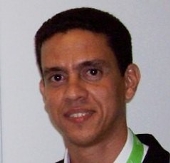Program Information
An Adaptable Approach for Education On Medical Physics at Undergraduate and Postgraduate Levels
R Miller-Clemente1, 2*, L Mendez-Perez2 , (1) Centro de Biofisica Medica, Santiago De Cuba, Santiago de Cuba, (2) Universidad de Oriente, Santiago De Cuba, Santiago de Cuba
Presentations
SU-E-E-7 (Sunday, July 12, 2015) 3:00 PM - 6:00 PM Room: Exhibit Hall
Purpose: To contribute to the professional profile of future medical physicists, technologists and physicians, and implement an adaptable educational strategy at both undergraduate and postgraduate levels.
Methods: The Medical Physics Block of Electives (MPBE) designed was adapted to the Program of B.S. in Physics. The conferences and practical activities were developed with participatory methods, with interdisciplinary collaboration from research institutions and hospitals engaged on projects of Research, Development and Innovation (RDI). The scientific education was implemented by means of critical analysis of scientific papers and seminars where students debated on solutions for real research problems faced by medical physicists. This approach included courses for graduates not associated to educational programs of Medical Physics (MP).
Results: The implementation of the MPBE began in September 2014, with the electives of Radiation MP and Introduction to Nuclear Magnetic Resonance. The students of second year received an Introduction to MP. This initiative was validated by the departmental Methodological Workshop, which promoted the full implementation of the MPBE. Both postgraduated and undergraduate trainees participated in practices with our DICOM viewer system, a local prototype for photoplethysmography and a home-made interface for ROC analysis, built with MATLAB. All these tools were designed and constructed in previous RDI projects. The collaborative supervision of University’s researchers with clinical medical physicists will allow to overcome the limitations of residency in hospitals, to reduce the workload for clinical supervisors and develop appropriate educational activities.
Conclusion: We demonstrated the feasibility of adaptable educational strategies, considering available resources. This provides an innovative way for prospective medical physicists, technologists and radiation oncologists. This strategy can be implemented in several regions without formal programs of MP, like most of developing countries. Starting with undergraduate students would allow to reach appropriate certification faster than most of traditional or alternative approaches for education on MP.
Funding Support, Disclosures, and Conflict of Interest: The authors acknowledge Radiation Consulting Group, LLC, an Arizona Corporation which promotes the use of ionizing radiation in the healing arts, for the "Oscar Luis Caballero" travel grant. The authors thanks to professors Meisbel Daudinot, David Adame and Alexander Pascau for the practices through imagis, imageROC and ANGIODIN PD3000 respectively.
Contact Email:


